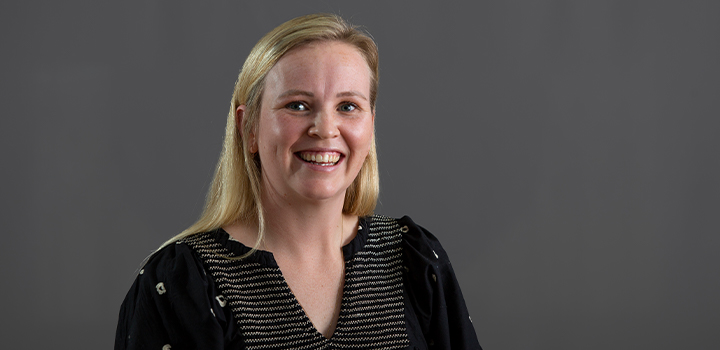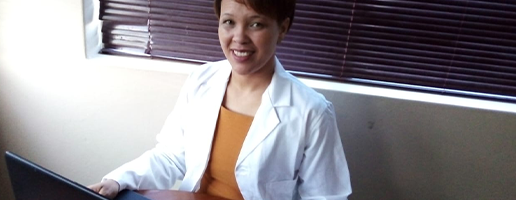Tackling post-traumatic stress disorder in ICU patients

Being in an intensive care unit and receiving critical care can be a harrowing experience. Psychiatry registrar Dr Sarah Boshoff is investigating how doctors and nurses can help to prevent triggers of post-traumatic stress disorder in patients.
Psychiatrists call it post-ICU syndrome, the development of mental illness following an ICU admission, which is common in patients around the world.
"In addition to the experience of going into ICU, South Africans patients also live in a society with high levels of crime and trauma, and a high number of us have symptoms of post-traumatic stress disorder," says Dr Sarah Boshoff, a psychiatry registrar studying the triggers of post-traumatic stress disorder in intensive care units.
Dr Boshoff is involved in research that stems from a larger cohort study, which Dr Elizabeth van der Merwe is conducting at Livingstone Hospital in Port Elizabeth.
Dr Boshoff has received a Rural individual Award from the Discovery Foundation to cover the costs of this study, which she is completing as part of her MMed degree.
"I have always been interested in people's stories"
Dr Boshoff was born in Port Elizabeth and matriculated at Pearson High School. She studied medicine at the University of Cape Town and became involved in the Students' Health and Welfare Centres Organisation, which offers primary healthcare services in Cape Town.
Today, she works at the Dora Nginza Provincial Hospital in Port Elizabeth while she is specialises in psychiatry. "Doctors don't always have the time to really talk to their patients to find out more about their life stories," she says. "As a psychiatry registrar, that is part of my job, and I really enjoy it," she says.
Her mother always reminded her that doctors learn the most when they are the patients. It is something she tries to remember when caring for patients, especially those who have had traumatic experiences before and during their admission to the ICU. "The study involves interviewing patients who have developed post-traumatic stress disorder after being admitted to the ICU," she explains.
"The aim is to identify shared experiences that can be used to recognise possible triggers during an intensive care admission. These triggers can have adverse mental health effects and contribute toward the development of post-traumatic stress disorder," she adds.
Denial a barrier to treatment for mental health issues
One of the difficulties she finds in her work is that people sometimes cannot admit that they are suffering from mental health problems. This prevents them from accessing treatment.
"It's not that we are more resilient as a nation - avoidance can be part of the problem of dealing with mental health issues," she says.
About 10% of patients admitted to intensive care units for critical care develop some form of post-traumatic stress disorder, according to the National Institutes of Health. Dr Boshoff screens patients for post-traumatic disorder, anxiety and major depressive disorder.
Interviews with patients are a big part of her research. There is sometimes a language barrier, and she has to use the services of an interpreter. Many patients do not remember what they went through in the ICU, and sometimes she has to rely on staff and families to fill in the gaps. Patients are often sedated, or they do not have a clear understanding of the procedures they went through, which can exacerbate the problem. Where possible, she encourages patients to keep an ICU diary.
Dr Boshoff was delighted when she heard that she had received a Rural Individual Award from the Discovery Foundation. She plans on using the grant to reimburse patients' travel costs and to pay for the services of translators.
This article was created for the 2020 Discovery Foundation Awards and has been edited for the Discovery Magazine.
About the Discovery Foundation
Since 2006, the Discovery Foundation has invested over R256 million in grants to support academic medicine through research, development and training medical specialists in South Africa.
The Discovery Foundation is an independent trust with a clear focus - to strengthen the healthcare system - by making sure that more people have access to specialised healthcare services. Each year, the Discovery Foundation gives five different awards to outstanding individual and institutional awardees in the public healthcare sector.
Related articles

Spotlight on the link between HIV and mental health conditions
There are common mental health conditions associated with HIV, but doctors do not always screen patients in mental health units for the virus. Dr Illana Links hopes that her research will help patients in mental health units and in community and HIV clinics.

Easing the mental health hardships of rural mothering
Dr Nokwazi Mtshengu's Discovery Fellowship Award is helping her translate to isiXhosa a globally accredited psychiatric tool to assess postpartum depression, which will benefit depressed mothers, the infant, family and broader community.

Vitamin deficiency evidence - a likely gamechanger in mental health
Megan Schultz's research on the nutritional state of mentally ill patients could significantly improve the lives of many people, especially if bolstered by evidence-based policies and changes in nutrition-related laws.